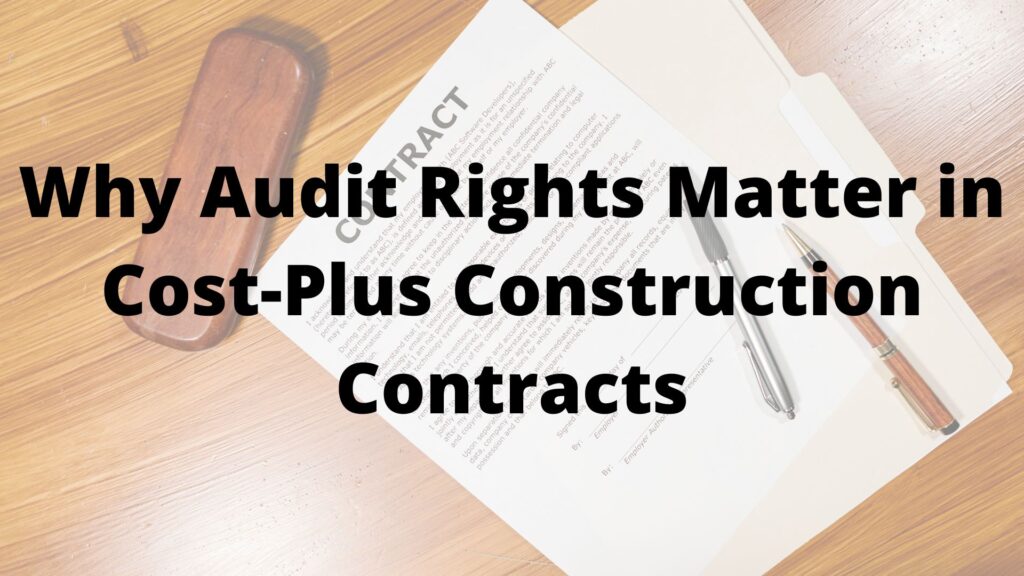
In the realm of construction contracts, the cost-plus model offers a seemingly transparent approach. The owner agrees to reimburse the contractor for their actual costs, plus a markup for overhead and profit. However, this very structure necessitates a crucial safeguard for the owner: the right to audit. Without it, owners leave themselves vulnerable to inflated costs, accounting errors, and potentially even fraudulent charges. This blog explores the critical importance of audit rights in cost-plus construction contracts, drawing upon general legal principles and highlighting their significance under Florida law.
The Inherent Risks of Cost-Plus Contracts
While cost-plus contracts can be beneficial in situations with undefined project scopes or fast-tracked schedules, they inherently carry risks for the owner. These risks stem from the fact that the contractor’s profit is tied to their costs. This can, unintentionally or intentionally, disincentivize cost control. Without the ability to scrutinize the contractor’s expenses, owners have limited means to ensure they are paying fair and accurate amounts.
The Power of the Audit Clause
An audit clause within a cost-plus construction contract grants the owner the legal right to examine the contractor’s books, records, and supporting documentation related to the project costs. This includes invoices, payroll records, subcontractor agreements, and any other financial information relevant to the costs being charged. A well-drafted audit clause should specify:
- The scope of the audit: What documents can be reviewed?
- The timing of the audit: When can the audit take place (during the project, after completion, or both)?
- The frequency of audits: Can the owner conduct multiple audits?
- Who can perform the audit: Can the owner use their own personnel or must they hire an independent auditor?
- The contractor’s obligations: What information and cooperation is the contractor required to provide?
- Remedies for discrepancies: What happens if the audit reveals overcharges or errors?
Legal Basis for Audit Rights
The right to audit in a contract is fundamentally based on the principle of contractual freedom. Parties are generally free to negotiate and include terms they deem necessary to protect their interests. When an audit clause is explicitly included in a cost-plus contract, it becomes a legally binding obligation on the contractor.
While specific case law directly addressing the necessity of an audit clause in cost-plus construction contracts might be nuanced and fact-specific, general contract law principles support the enforceability of such clauses. Courts generally uphold clear and unambiguous contractual terms. If a contract grants the owner the right to audit, and the contractor impedes this right or the audit reveals discrepancies, the owner typically has legal recourse to seek recovery of overpaid funds.
Florida Contract Law Considerations
Under Florida law, contracts are interpreted according to their plain language. Therefore, a clearly written audit clause in a cost-plus construction contract will generally be enforced by Florida courts. Florida courts recognize the importance of clear contractual terms in defining the rights and obligations of contracting parties.
Furthermore, Florida law implies a covenant of good faith and fair dealing in every contract. This means that both parties are expected to act honestly and reasonably in the performance of their contractual obligations. While this implied covenant can offer some protection against egregious overbilling, it is not a substitute for the explicit right to audit. An audit clause provides a concrete mechanism for verifying the contractor’s adherence to the contract terms and ensuring fair dealing.
Case Studies and Examples (Illustrative)
While specific Florida case law directly mandating audit rights in cost-plus contracts might not be prevalent, consider the analogous situation of government contracts. Public sector contracts, particularly those on a cost-reimbursement basis, almost universally include stringent audit provisions to ensure taxpayer money is being spent appropriately. This highlights the fundamental need for oversight when costs are being reimbursed.
In the private sector, imagine a scenario where an owner relies solely on the contractor’s invoices without an audit clause. Years later, upon discovering accounting irregularities or suspect charges, the owner would face significant hurdles in challenging those costs without the contractual right to review the underlying documentation. An audit clause provides the contemporaneous right to verify costs, making it much easier to identify and address any discrepancies.
Practical Benefits of Audit Rights
Having audit rights in a cost-plus construction contract offers several key benefits to the owner:
- Deterrence: The very presence of an audit clause can deter contractors from inflating costs or engaging in questionable billing practices. Knowing their records can be scrutinized provides a strong incentive for accuracy and transparency.
- Cost Control: Regular audits allow owners to identify and address potential overcharges or inefficiencies in a timely manner, preventing costs from spiraling out of control.
- Transparency and Accountability: Audit rights foster greater transparency in the project’s financials, building trust and accountability between the owner and the contractor.
- Verification of Compliance: Audits can ensure that costs being charged are actually in accordance with the terms of the contract, including agreed-upon rates, markups, and allowable expenses.
- Dispute Resolution: In the event of a cost dispute, audit records provide objective evidence to support the owner’s position.
In conclusion, for owners entering into cost-plus construction contracts, including a comprehensive audit clause is not merely advisable – it is essential for protecting their financial interests. While the cost-plus model offers flexibility, it also necessitates robust oversight. By securing the right to audit, owners empower themselves to ensure transparency, control costs, and ultimately achieve a successful and fairly priced construction project. Under Florida law and general contract principles, a well-drafted audit clause will be upheld, providing owners with a critical tool for safeguarding their bottom line.
 John Caravella Esq., is a construction attorney and formerly practicing project architect at The Law Office of John Caravella, P.C., representing architects, engineers, contractors, subcontractors, and owners in all phases of contract preparation, litigation, and arbitration across New York and Florida. He also serves as an arbitrator to the American Arbitration Association Construction Industry Panel. Mr. Caravella can be reached by email: [email protected] or (631) 608-1346.
John Caravella Esq., is a construction attorney and formerly practicing project architect at The Law Office of John Caravella, P.C., representing architects, engineers, contractors, subcontractors, and owners in all phases of contract preparation, litigation, and arbitration across New York and Florida. He also serves as an arbitrator to the American Arbitration Association Construction Industry Panel. Mr. Caravella can be reached by email: [email protected] or (631) 608-1346.
The information provided on this website does not, and is not intended to, constitute legal advice; instead, all information, content, and materials available on this site are for general informational purposes only. Readers of this website should contact their attorney to obtain advice with respect to any particular legal matter. No reader, user, or browser of this site should act or refrain from acting on the basis of information on this site without first seeking legal advice from counsel in the relevant jurisdiction. Only your individual attorney can provide assurances that the information contained herein – and your interpretation of it – is applicable or appropriate to your particular situation. Use of, and access to, this website or any of the links or resources contained within the site do not create an attorney-client relationship between the reader, user, or browser and website authors, contributors, contributing law firms, or committee members and their respective employers.
- Florida Statutes, Chapter 672 (Uniform Commercial Code – Sales): While not directly addressing construction contracts, it provides a foundational understanding of contractual obligations and remedies in Florida.
- Florida Statutes, Chapter 725 (Construction Contracts): This chapter addresses various aspects of construction contracts in Florida, though specific requirements for audit clauses are not explicitly mandated, reinforcing the need for explicit contractual inclusion.
- Couch on Insurance 3d: While focused on insurance, it provides general principles of contract interpretation that are applicable to construction contracts.
- American Institute of Architects (AIA) Document A101™ – 2017, Standard Form of Agreement Between Owner and Contractor where the basis of payment is a Stipulated Sum (for comparison purposes; cost-plus versions like A102™ also address accounting): Reviewing standard form contracts can offer insights into typical clauses, including those related to accounting and cost verification, although customization is always recommended.
- Associated General Contractors of America (AGC) Contract Documents: Similar to AIA documents, AGC forms provide examples of contract language and considerations for cost-plus agreements.
